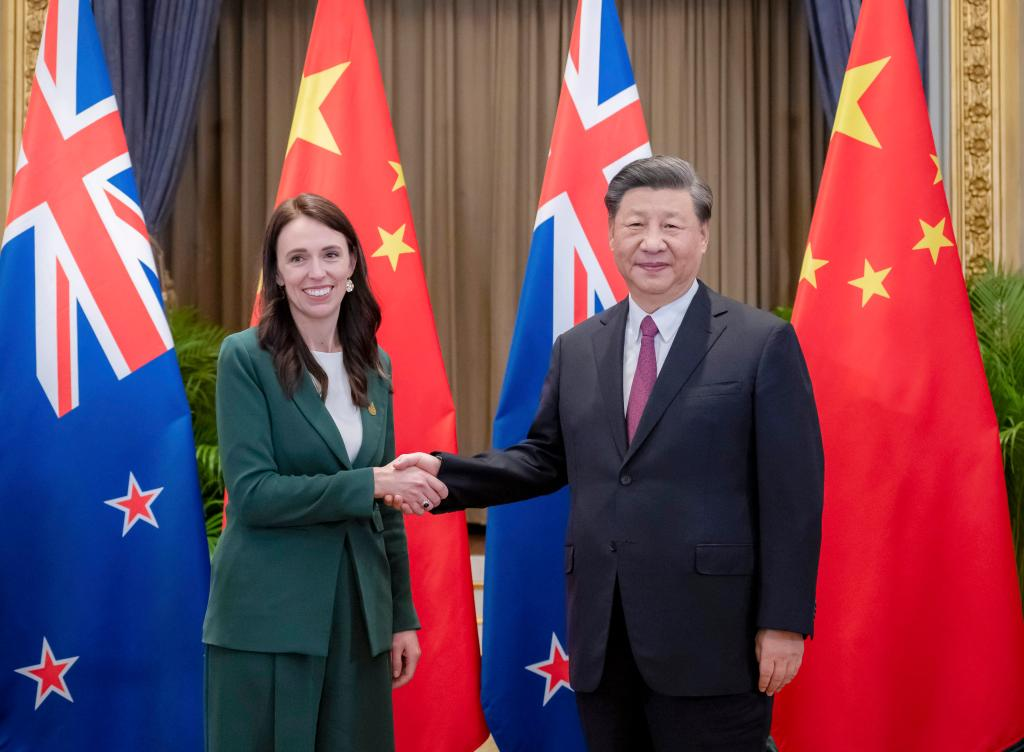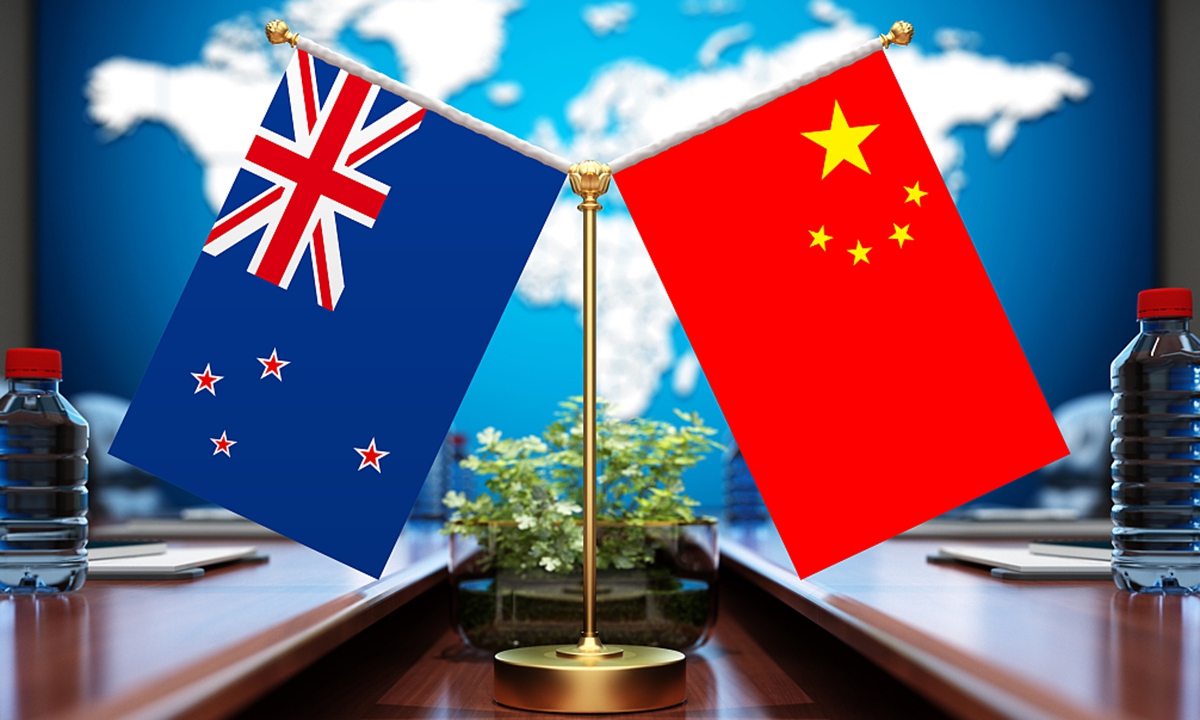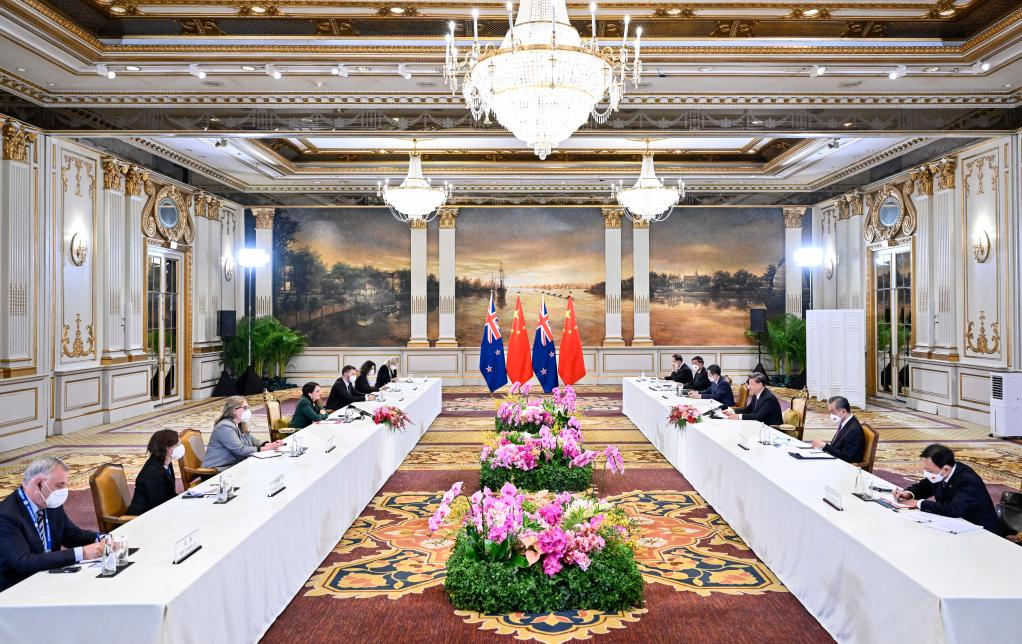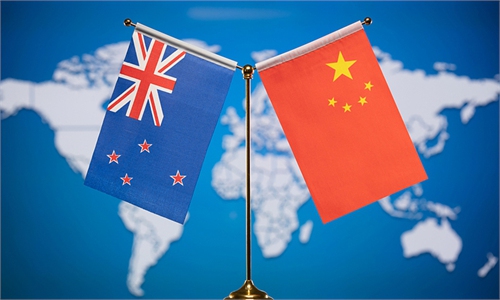China willing to coordinate with New Zealand for stability in Pacific islands region: Xi
Top leaders’ meeting lays foundation for deeper cooperation in post-COVID-19 era: analysts

Chinese President Xi Jinping meets with New Zealand Prime Minister Jacinda Ardern in Bangkok, Thailand, Nov 18, 2022. Photo:Xinhua
China is willing to coordinate closely with New Zealand to jointly promote peace, stability, development and prosperity in the Pacific island countries region, Chinese President Xi Jinping said on Friday during his meeting with New Zealand Prime Minister Jacinda Ardern, while also highly praising Ardern's repeated remarks on the country's adherence to an independent foreign policy.
The Friday meeting, which was held on the sidelines of the 29th Asia-Pacific Economic Cooperation (APEC) Economic Leaders' Meeting in Bangkok, was the first in-person bilateral meeting between Xi and Ardern since 2019. Analysts said it would lay the foundation for deeper cooperation between China and New Zealand in the post-COVID-19 era, and they also noted that the non-aligned foreign policy fits New Zealand's interests more than closely following the US in hyping the "China threat" narrative or preventing China's cooperation with Pacific island nations.
Noting that this year marks the 50th anniversary of the establishment of diplomatic ties between China and New Zealand, Xi said that during the past five decades, China-New Zealand relations have maintained a healthy and stable development.
As comprehensive strategic partners, both countries should enhance communication, step up mutual trust and accommodate each other's core interests and major concerns to ensure that bilateral relations stay on the right course for sustainable development, said Xi.
During the meeting, Ardern said both countries should take the 50th anniversary of diplomatic ties as an opportunity, seriously sum up experience to further enhance high-level exchanges and deepen cooperation in trade and economy, education, climate change and other fields.
She also said that New Zealand views China as a major force for promoting the world's future development and prosperity, adding that her country adheres to the one-China policy.
On Friday, President Xi also met with Papua New Guinea (PNG) Prime Minister James Marape.

China-New Zealand photo:VCG
The meeting between Xi and Ardern is important as it lays the foundation for the countries to deepen mutually beneficial cooperation in the post-COVID-19 era, Yu Lei, chief research fellow at the research center for Pacific island countries of Liaocheng University, told the Global Times.
Further facilitating trade with China was a focus for Ardern's meeting with Xi, as New Zealand is facing pressure from inflation and supply chain woes and the global economy has been affected by the COVID-19 pandemic and geopolitical events, analysts said.
As a leader who insists on pragmatic policy, Ardern has attached importance to ties with China and to promoting bilateral trade, said Yu.
For example, in April, the two countries upgraded the protocol of the China-New Zealand Free Trade Agreement (FTA), which was signed in 2008 and provided a great deal of impetus to the trading relationship. Analysts called the upgrading a major move that would not only help further expand bilateral economic and trade cooperation but also inject certain positive momentum into regional and global trade cooperation.
China is now New Zealand's largest trading partner in goods and second largest overall including trade in services. Since 2007, two-way trade has increased from NZ$10 billion to NZ$30 billion, according to data from the New Zealand Ministry of Foreign Affairs and Trade.

Chinese President Xi Jinping meets with New Zealand Prime Minister Jacinda Ardern in Bangkok, Thailand, Nov 18, 2022. Photo:Xinhua
During their meeting, Xi also noted that pursuing peace and promoting development and cooperation have always been the starting point of China's policy toward the Pacific island countries.
Ardern said that New Zealand is devoted to enhancing communication with China and deepening understanding about each other, and is willing to carry out in-depth exchanges with China on South Pacific affairs to contribute to prosperity and stability in the Asia-Pacific region.
The US and its allies, especially Australia, have hyped "China threat," as China and more Pacific Island nations seek closer cooperation. As a member of the Five Eyes intelligence-sharing alliance led by the US, New Zealand is also facing increasing pressure from Washington as the US ramps up its efforts in pushing its Indo-Pacific strategy to pull more countries in to contain China, analysts said.
In May, during a meeting at the White House, Ardern and the US "aired shared concerns" about China's bid to "expand its influence in the Pacific," Reuters reported.
The US and some Western countries, including Australia, took Pacific island nations as their colonies in history and now see them as a sphere of influence - this is why China's mutually beneficial cooperation with island nations unsettles them, Yu said, noting that it is the island nations' choice to cooperate with China, and the US' attempt to sow discord will not succeed.
Analysts said that unlike some US allies that have served as anti-China spearheads, New Zealand has acted with restraint and tried to stick to an independent foreign policy, which has also won it more space for diplomacy and defending its own interests.
Dave Bromwich, former president of the New Zealand China Friendship Society (NZCFS), told the Global Times in a previous interview that he totally disagrees with New Zealand becoming involved in a confrontation with China. New Zealand should respect the Chinese ambition to create a harmonious global community, he said.
"While I acknowledge that the pressure on the New Zealand government to join the confrontation is strong, I do not believe it is either in the best interests of New Zealand to join the US to contain China, nor do I think the [New Zealand] government will be able to take this direction. New Zealand should set an example to other Western nations to maintain a non-aligned foreign policy."
Yu said that in past years, the US' plans to lead the West to decouple with China or impose a blockade on technologies have been bankrupted, as China's tendency toward economic rebound is quite clear, while the World Bank and the International Monetary Fund have warned of recession in the US and Western countries. Against such a background, some Western countries have been busy fixing or improving relations with China.
Maintaining better relations would not only benefit New Zealand and China amid increasing global challenges, but also contribute to regional stability, analysts said.

